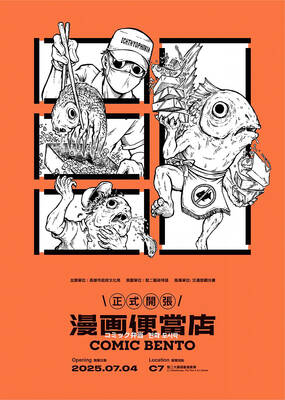After her hugely popular appearance at last year's Taipei International World Music Festival (
Born into a family of farmers in the Ordos region of Southwest Inner Mongolia, Urna and her hauntingly atmospheric vocal prowess have traveled the world for almost a decade, enchanting audiences with her repertoire of both traditional and contemporary Mongolian tunes.
Entering the Shanghai Conservatory's Institute of Traditional Chinese Music (

PHOTO COURTESY OF DADA ARTS
She put down the stringed instrument shortly thereafter, however. Having mastered the lute as well as the Mandarin language, she set out on a career as a singer. Her first vocalizing venture was with the Gaoshan Liushui (高山流水樂團) ensemble, China's first and most influential world music troupe.
Urna's solo recording career began in the mid-1990s after she was picked up by German label, KlangRaume. Since releasing her first album, Tal Nutag, in 1995, Urna has seen her three subsequent albums make inroads into music charts around the globe. Her most release being last year's Jamar.
Not allowing her international fame to cloud her musical outlook, Urna makes regular trips back to her homeland to collect songs and stories and tours the steppes searching for elderly folks with whom to exchange musical ideas apropos interpreting and performing age-old Mongolian songs.
Assisting Urna in filling the Taipei venue with a heap of Mongolian color and sound will be her international backing group of Indian national, Ramesh Shotham on percussion, Hungarian Zoltan Lantos on violin and Germany's Maria Reiter on accordion and zither. Tomorrow night's support act will be the nation's favorite politico-folk group, Labor Exchange (
Taipei's Sun Yat-sen Memorial Hall (台北國父紀念館) on Saturday, Oct. 12. Tickets cost between NT$300 and NT$1,200 and are available from FNAC and ACER ticketing outlets nationwide.

July 28 to Aug. 3 Former president Chiang Kai-shek (蔣介石) reportedly maintained a simple diet and preferred to drink warm water — but one indulgence he enjoyed was a banned drink: Coca-Cola. Although a Coca-Cola plant was built in Taiwan in 1957, It was only allowed to sell to the US military and other American agencies. However, Chiang’s aides recall procuring the soft drink at US military exchange stores, and there’s also records of the Presidential Office ordering in bulk from Hong Kong. By the 1960s, it wasn’t difficult for those with means or connections to obtain Coca-Cola from the

Taiwan is today going to participate in a world-first experiment in democracy. Twenty-four Chinese Nationalist Party (KMT) lawmakers will face a recall vote, with the results determining if they keep their jobs. Some recalls look safe for the incumbents, other lawmakers appear heading for a fall and many could go either way. Predictions on the outcome vary widely, which is unsurprising — this is the first time worldwide a mass recall has ever been attempted at the national level. Even meteorologists are unclear what will happen. As this paper reported, the interactions between tropical storms Francisco and Com-May could lead to

A couple of weeks ago the parties aligned with the People’s Republic of China (PRC), the Chinese Nationalist Party (KMT) and the Taiwan People’s Party (TPP), voted in the legislature to eliminate the subsidy that enables Taiwan Power Co (Taipower) to keep up with its burgeoning debt, and instead pay for universal cash handouts worth NT$10,000. The subsidy would have been NT$100 billion, while the cash handout had a budget of NT$235 billion. The bill mandates that the cash payments must be completed by Oct. 31 of this year. The changes were part of the overall NT$545 billion budget approved

It looks like a restaurant — but it’s food for the mind. Kaohsiung’s Pier-2 Art Center is currently hosting Comic Bento (漫畫便當店), an immersive and quirky exhibition that spotlights Taiwanese comic and animation artists. The entire show is designed like a playful bento shop, where books, plushies and installations are laid out like food offerings — with a much deeper cultural bite. Visitors first enter what looks like a self-service restaurant. Comics, toys and merchandise are displayed buffet-style in trays typically used for lunch servings. Posters on the walls present each comic as a nutritional label for the stories and an ingredient